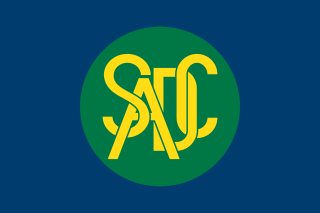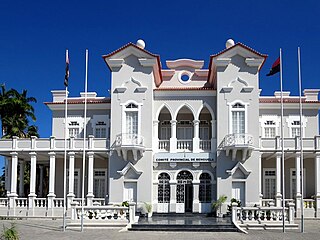Related Research Articles

Angola, officially the Republic of Angola, is a country on the west coast of Southern Africa. It is the second largest lusophone (Portuguese-speaking) country in both total area and population, and it is the seventh-largest country in Africa, bordered by Namibia to the south, the Democratic Republic of the Congo to the north, Zambia to the east, and the Atlantic Ocean to the west. Angola has an exclave province, the province of Cabinda that borders the Republic of the Congo and the Democratic Republic of the Congo. The capital and largest city of Angola is Luanda.

Luanda, is the capital and largest city in Angola. It is Angola's primary port, and its major industrial, cultural and urban centre. Located on Angola's northern Atlantic coast, Luanda is Angola's administrative centre, its chief seaport, and also the capital of the Luanda Province. Luanda and its metropolitan area is the most populous Portuguese-speaking capital city in the world, with over 8.3 million inhabitants in 2020.

The Southern African Development Community (SADC) is an inter-governmental organization headquartered in Gaborone, Botswana. Its goal is to further socio-economic cooperation and integration as well as political and security cooperation among 16 southern African countries.

Benguela is a city in western Angola, capital of Benguela Province. Benguela is one of Angola's most populous cities with a population of 555,124 in the city and 561,775 in the municipality, at the 2014 census.

The Economic Community of Central African States is an Economic Community of the African Union for promotion of regional economic co-operation in Central Africa. It "aims to achieve collective autonomy, raise the standard of living of its populations and maintain economic stability through harmonious cooperation".

The National Assembly is the legislative branch of the government of Angola. The National Assembly is a unicameral body, with 220 members: 130 members elected by proportional representation and 90 members elected by provincial districts.
The National Union of Angolan Workers (UNTA) is a national Trade union centre of Angola.
The Independent Union of Maritime and Related Workers (SIMA) is a small, independent trade union centre of Angola.
Before 1975, while under Portuguese rule, Trade unions in Angola existed primarily as "occupational syndicates" - operating welfare services, but banned from collective bargaining and strike action. Independent African trade unions were illegal, however, some underground or exiled unions existed, and were involved in the struggle for Angolan independence.

Angola–China relations date back to pre-independent Angola. Today they are based on an emerging trade relationship. As of 2011, Angola is China's second biggest trading partner in Africa.

The People's Republic of Angola was the self-declared socialist state which governed Angola from its independence in 1975 until 25 August 1992, during the Angolan Civil War.

Slavery in Angola existed since the late 15th century when Portugal established contacts with the peoples living in what is the Northwest of the present country, and founded several trade posts on the coast. A number of those peoples, like the Imbangala and the Mbundu, were active slave traders for centuries. In the late 16th century, Kingdom of Portugal's explorers founded the fortified settlement of Luanda, and later on minor trade posts and forts on the Kwanza River as well as on the Atlantic coast southwards until Benguela. The main component of their trading activities consisted in a heavy involvement in the Atlantic slave trade. Slave trafficking was abolished in 1836 by the Portuguese authorities.

Angola–Russia relations is the relationship between the two countries, the Republic of Angola and the Russian Federation. Russia has an embassy in Luanda. Angola has an embassy in Moscow and an honorary consulate in Saint Petersburg. Angola and the precursor to Russia, the Soviet Union, established relations upon Angola's independence.

Russia–Zambia relations is the bilateral relationship between Russia and Zambia.

Portuguese Angola refers to Angola during the historic period when it was a territory under Portuguese rule in southwestern Africa. In the same context, it was known until 1951 as Portuguese West Africa.

Angola–India relations refers to the bilateral ties between the India and the Angola. Both nations are part of the Non-Aligned Movement. Being a member of the African Union, Angola supports India's candidature for a permanent seat in a reformed Security Council. India has an embassy in Luanda, Angola. Angola has an embassy in New Delhi, India.
Liga Geral dos Trabalhadores de Angola was an Angolan trade union organization in exile. Being based amongst Angolan refugees in neighbouring Congo-Kinshasa, LGTA was linked to the National Liberation Front of Angola (FNLA). During the 1960s, LGTA was the largest Angolan trade union outfit.
Confederação Geral dos Trabalhadores de Angola was a Catholic Angolan trade union organization in exile. CGTA was founded in 1962. CGTA advocated in favour of 'trade union pluralism', and was independent of political parties.
Confederação Nacional dos Trabalhadores de Angola was an Angolan trade union organization. CNTA was founded by Mauricio Luvualu in Luanda in 1974. Luvualu had been a leader of the União Geral dos Trabalhadores de Angola, but was handed over by the Kinshasa government to the Portuguese in 1971 and sentenced to forced labour. Upon his release in 1974 he received a financial compensation, and with these funds he set up CNTA. For a brief period until MPLA monopolized trade union activities under UNTA, CNTA was the main labour organization inside the country. CNTA organized a series of strikes demanding higher salaries and improved terms of employment. The organization protested against the proposal to install a single trade union centre in the country, charging it as being a plot hatched by the Portuguese government.
Central Sindical Angolana is a trade union centre in Angola. It was previously based in exile in Zaire. CSA is not affiliated to any international trade union confederation.
References
- ICTUR; et al., eds. (2005). Trade Unions of the World 6th Ed. John Harper Publishing. ISBN 0-9543811-5-7.